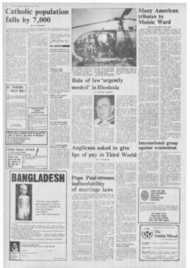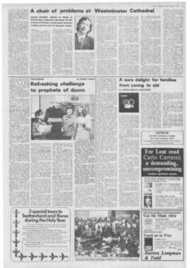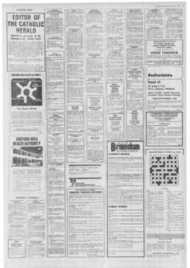Page 6, 7th February 1975
Page 6

Report an error
Noticed an error on this page?If you've noticed an error in this article please click here to report it.
Tags
Share
Related articles
Gay Young Burglar Who, Discovered Red-handed, Takes...
Films Maureen Vincent
Cleaning Out The Cinema Stable
Bavarian Castles Of Stunning Beauty
A Master's Best
Unlucky victim of cinema's 'glacier progress'
by FREDA BRUCE LOCKHART Notes for a Life by Bryan Forbes (Collins ist)
Bryan Forbes has been a singularly unlucky victim of the British cinema's "glacier progress", as he puts it. to insolvency. I first remember Forbes, when we were both working for the same television company, as an engaging lightweight, a "minor actor" he calls himself, appearing weekly in a "Zoo" series.
From acting he took to script-. doctoring and writing, later to directing and producing films. In 1958 he and his friend Richard Attenborough (here misleadingly nicknamed "Bunter") founded Beaver Films.
Their first heartening successes were "Whistle Down the Wind" with Hayley Mills and Alan Bates; "Seance in the Afternoon" and "The Angry Silence", their very brave account of a trade union member "sent to Coventry". (Would it be possible today for anybody to make a film like "The Angry Silence", or like the equally sharp comment on union practices made by the Boultings and
Peter Sellers in "I'm All right, Jack"?) At this turn in Forbes's career the book also takes off in more original style than the conventionally-told tale of the "little Cockney boy" (nee Clarke) evacuated from Wanstead, who drifted into drama school, then the Army, first in the Intelligence Corps then the Combined Services Entertainment Unit on the bases — with Terry Thomas, Harry Secombe and other "Stars in Battledress" — of a single broadcast where he also acquired his new name. The War Office's blank ignorance of the profession for which the CSEU was founded provides a comic interlude worthy of Wodehouse. With the actor's evolution into filmmaker, Forbes's book becomes not only entertaining gossip but the illuminating notebook of a draftsman,
After all, he had made such outstanding successes as "The Whisperers" with Dame Edith Evans, "King Rat", "The Mad Woman of Chaillot" (with Katharine Hepburn), "The Wrong Box" and "The Raging Moon." Yet the news of his elevation to be Head of Produc tion for EMI-MGM came as a sensation.
He did them credit, too, with "The Go-Between," "The Tales of Beatrix Potter" and Dame Margot Fonteyn's "I Am a Dancer." So when he has to write: "Easter 1971 and I had just been relieved of all further responsibility as Head of Production for EMI-MGM Studios" the blow must have been bitter.
The story of that precipitous rise and fall is not told here. "The time is uot ripe," says Forbes. And we sense the bitterness. But he promises to tell all in another instalment.
The present title offer only Notes for a Life and when the time come,i no doubt some of the juvenilia will be pruned. There is a poignant passage about his unsuccessful first trip to Hollywood at the time of his unsuccesful first marriage to the Irish actress Constance Smith,
Some of the best accounts are of plans for films which were never made, like a Churchill script and a flurry of flights to Italy summoned for vain discussions with Cary Grant who seems to have put on an antic disposition I vaguely recollect from my own interviews.
That Mr Forbes can write scathingly of cinematic maladministration his novel "Present Laughter" proved. Here he combines a tribute to John Trevelyan as film censor with his own dislike of all censorship and a denunciation of "Last Tango in Paris" and lesser "X" films which make censorship necessary.
Forbes's comments are on the whole modest and practical despite traces of an actor's vanity. There are also virtues characteristics of actors in the candour, loyalty to such proven friends as Attenborough, the late Jack Hawkins, Lionel Gamlin and Raoul Walsh, and devotion to his wife Nanette Newman and their daughters.
blog comments powered by Disqus











